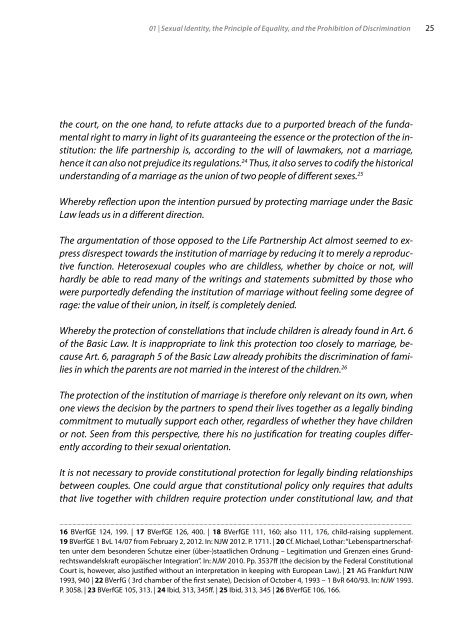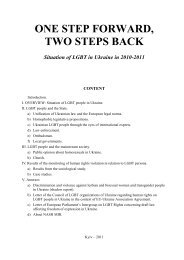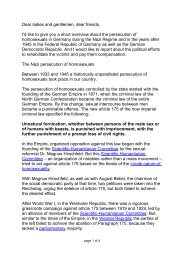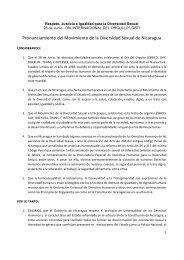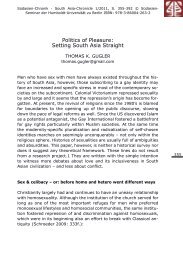Vom Verbot zur Gleichberechtigung - Hirschfeld-Eddy-Stiftung
Vom Verbot zur Gleichberechtigung - Hirschfeld-Eddy-Stiftung
Vom Verbot zur Gleichberechtigung - Hirschfeld-Eddy-Stiftung
Sie wollen auch ein ePaper? Erhöhen Sie die Reichweite Ihrer Titel.
YUMPU macht aus Druck-PDFs automatisch weboptimierte ePaper, die Google liebt.
01 | Sexual Identity, the Principle of Equality, and the Prohibition of Discrimination<br />
the court, on the one hand, to refute attacks due to a purported breach of the fundamental<br />
right to marry in light of its guaranteeing the essence or the protection of the institution:<br />
the life partnership is, according to the will of lawmakers, not a marriage,<br />
hence it can also not prejudice its regulations. 24 Thus, it also serves to codify the historical<br />
understanding of a marriage as the union of two people of different sexes. 25<br />
Whereby reflection upon the intention pursued by protecting marriage under the Basic<br />
Law leads us in a different direction.<br />
The argumentation of those opposed to the Life Partnership Act almost seemed to express<br />
disrespect towards the institution of marriage by reducing it to merely a reproductive<br />
function. Heterosexual couples who are childless, whether by choice or not, will<br />
hardly be able to read many of the writings and statements submitted by those who<br />
were purportedly defending the institution of marriage without feeling some degree of<br />
rage: the value of their union, in itself, is completely denied.<br />
Whereby the protection of constellations that include children is already found in Art. 6<br />
of the Basic Law. It is inappropriate to link this protection too closely to marriage, because<br />
Art. 6, paragraph 5 of the Basic Law already prohibits the discrimination of families<br />
in which the parents are not married in the interest of the children. 26<br />
The protection of the institution of marriage is therefore only relevant on its own, when<br />
one views the decision by the partners to spend their lives together as a legally binding<br />
commitment to mutually support each other, regardless of whether they have children<br />
or not. Seen from this perspective, there his no justification for treating couples differently<br />
according to their sexual orientation.<br />
It is not necessary to provide constitutional protection for legally binding relationships<br />
between couples. One could argue that constitutional policy only requires that adults<br />
that live together with children require protection under constitutional law, and that<br />
.............................................................................................................................................................................................................................................................................<br />
16 BVerfGE 124, 199. | 17 BVerfGE 126, 400. | 18 BVerfGE 111, 160; also 111, 176, child-raising supplement.<br />
19 BVerfGE 1 BvL 14/07 from February 2, 2012. In: NJW 2012. P. 1711. | 20 Cf. Michael, Lothar: “Lebenspartnerschaften<br />
unter dem besonderen Schutze einer (über-)staatlichen Ordnung – Legitimation und Grenzen eines Grundrechtswandelskraft<br />
europäischer Integration”. In: NJW 2010. Pp. 3537ff (the decision by the Federal Constitutional<br />
Court is, however, also justified without an interpretation in keeping with European Law). | 21 AG Frankfurt NJW<br />
1993, 940 | 22 BVerfG ( 3rd chamber of the first senate), Decision of October 4, 1993 – 1 BvR 640/93. In: NJW 1993.<br />
P. 3058. | 23 BVerfGE 105, 313. | 24 Ibid, 313, 345ff. | 25 Ibid, 313, 345 | 26 BVerfGE 106, 166.<br />
25


